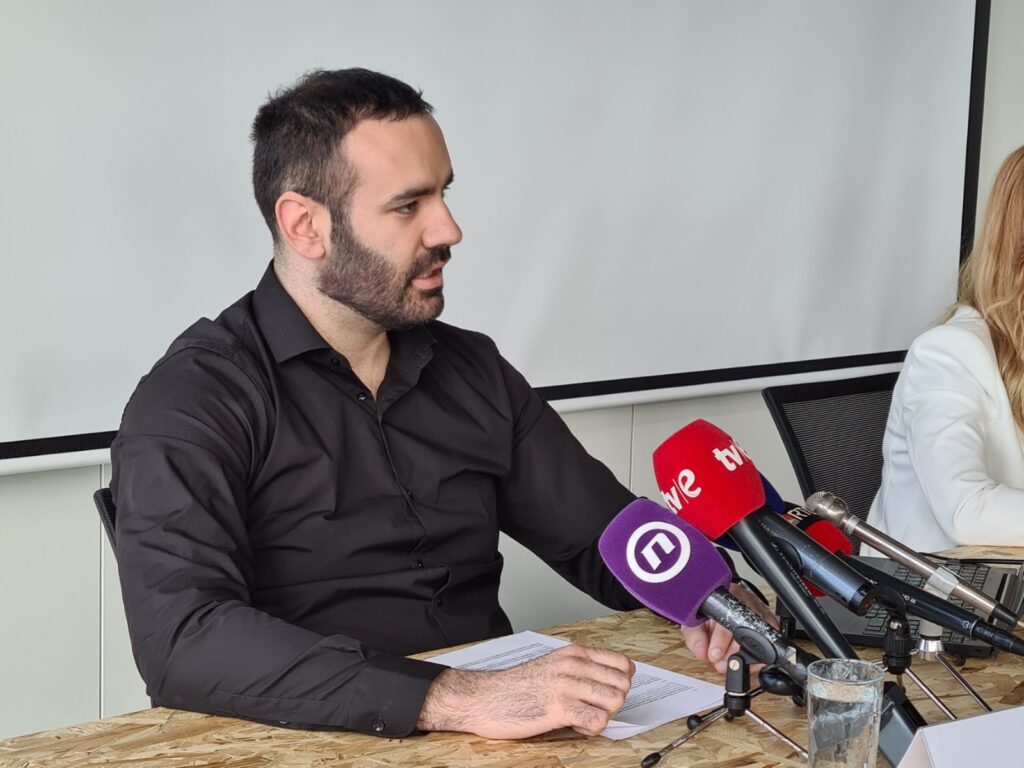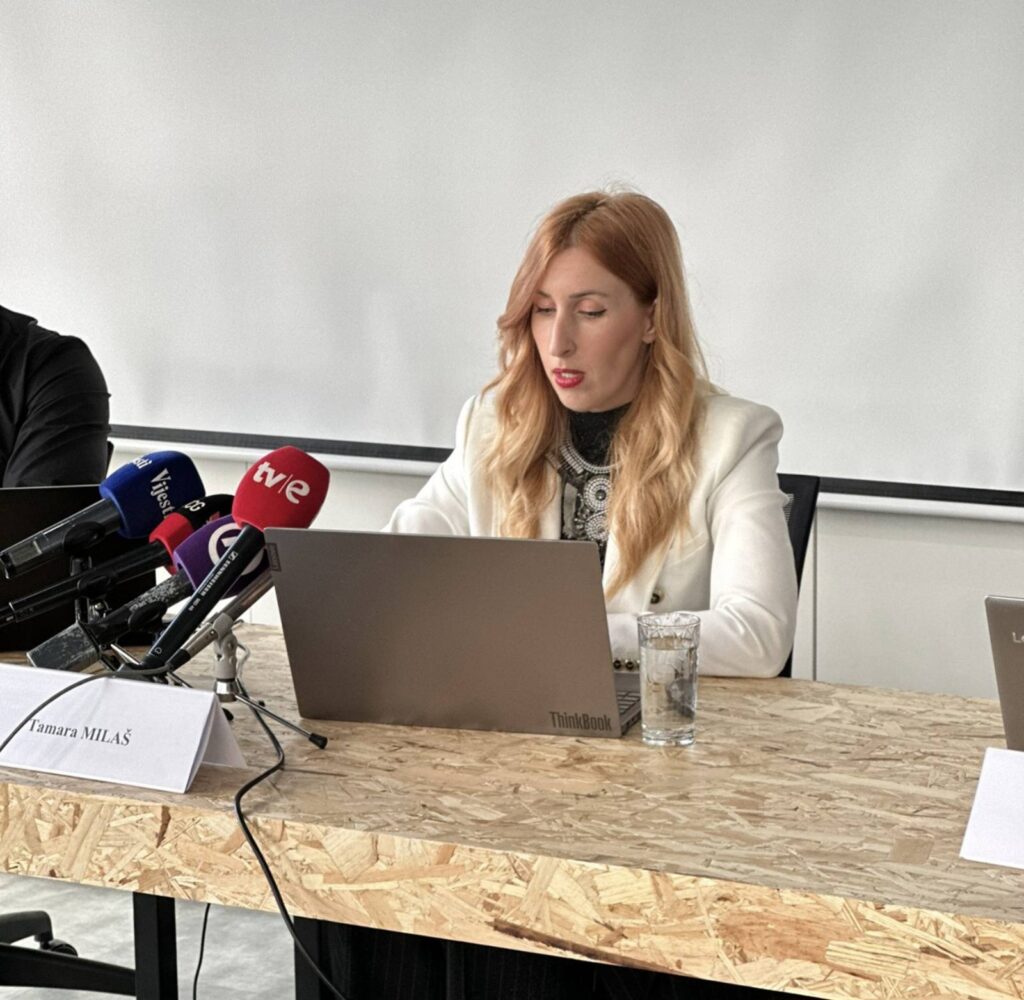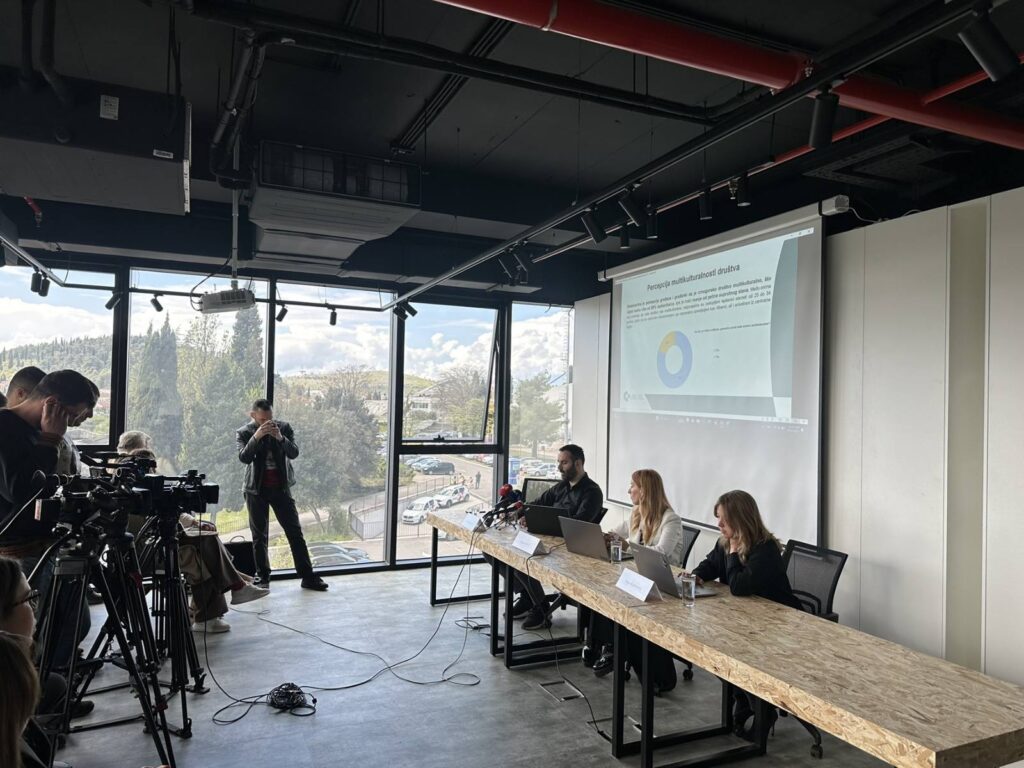On a general level, prevails the perception of citizens that Montenegrin society is multicultural, as emphasized by more than 80% of the respondents, and a little less than a fifth have the opposite opinion. However, as one goes deeper and when certain issues are reflected on a personal level, a completely different situation burdened with serious distances and prejudices is noted, according to the results of the public opinion survey on multiculturalism in Montenegro, which was carried out as part of the project “Multiculturalism, minority peoples and other minority national communities in the Montenegrin educational system” conducted by the Centre for Civic Education (CCE) with the financial support of the Fund for the Protection and Realization of Minority Rights.
“The dominant perception of citizens is that Montenegrin society is multicultural, which is emphasized by slightly more than 80% of the respondents, whereas slightly less than a fifth has the opposite opinion. But, the citizenry is divided in the position if there is discrimination based on religious affiliation in Montenegro – 48.4% of them believe that such discrimination exists, and 51.6% consider it does not exist. The perception of the existence of discrimination based on nationality is significantly more pronounced – about 60% of respondents state that it exists in Montenegro, and 40% have the opposite opinion. Respondents who recognize the existence of discrimination based on nationality, state Roma as the most discriminated national group, followed by Albanians and Muslims. Almost two-thirds of the respondents stated that they did not feel threatened because of their ethnic or religious affiliation, while a third had the feeling of such a threat,” said Vasilije Radulović, program associate at the CCE.

Citizens are divided about whether members of a certain nationality are privileged compared to others – 51.5% answered yes, and 48.5% were of the opposite opinion. Serbs and Montenegrins are the national groups that are seen as the most privileged, and Roma and Croats as the least privileged, according to the research findings.
About 55% of respondents believe that members of their national community are sufficiently or mostly represented in decision-making places at the state level, while about 36% have the opposite stance.
“Citizens believe that the Government (40.6%), non-governmental organizations (39.8%), and Ombudsman (36.6%) are the leading institutions/organizations that contribute the most to strengthening public awareness of the importance of multiculturalism, and the smallest contribution is made by the Parliament (18.7%) and academic community (20.2%). It is similar when it comes to those who contribute the most to reducing discrimination against different groups, where the Ombudsman (40.3%), non-governmental organizations (36.2%), and the Government (29.8%) are seen as key, while national councils (5.6%) and the Parliament (16.2%) are perceived as the subjects that contribute the least to reducing discrimination,” explained Radulović.
About 60% of respondents believe that the Montenegrin Constitution and laws sufficiently protect the rights of minority peoples in Montenegro. Among those who are not of that opinion are respondents who identify themselves as Roma and Albanian are dominant.
There is an approximate percentage of respondents, about a third, who believe that the issue of exercising the rights of minority peoples is not, i.e it is, sufficiently represented in the programmes of political parties.
The majority position is that the Government must include discrimination in its work priorities (42.2%), while less than a third (29%) believe that discrimination is a problem, but that other bigger problems need to be solved. Less than a fifth (17.4%) believe that discrimination does not exist to a large extent and does not represent a significant problem.
“Around a third of respondents are familiar with the work of the Ministry of Human and Minority Rights in the area of affirming the rights of minority peoples. Those who are familiar with the work of the Ministry in promoting inter-ethnic tolerance, on a scale of 1 to 5, rate that work with an average score of 3.00. Two-thirds of respondents are not aware that there are national councils of minority communities in Montenegro,” said Vasilije Radulović.
The dominant majority (75%) believes that they are familiar with the culture and customs of the minority peoples in Montenegro, while every fourth respondent, mostly or at all, is not familiar with the culture and tradition of the minority peoples in Montenegro.
The largest percentage of respondents has a neutral attitude regarding the information and reporting of the public service RTCG about their national community, while every third assesses the reporting and information as positive, and every fifth as negative. The attitude is similar when it comes to private media.
“About 2/3 of those surveyed believe that the media influence formation of attitudes towards national minorities, while 1/3 of the respondents have no such influence. Additionally, among those who believe that the media influence formation of attitudes towards national minorities, the largest number believe that this influence is negative (44.7%), while there is an approximate percentage of those who believe that this influence is neutral or positive is similar,” pointed out Radulović.
Tamara Milaš, Human Rights Programme Coordinator at the CCE, presented the other parts of the research, starting with the perception of discrimination against minority peoples in Montenegro by area.
“The surveyed citizens, regardless of their nationality, as well as other socio-demographic characteristics, believe that minority peoples in Montenegro are the most discriminated against in the field of employment, both in the state and in the private sector, and are the least discriminated in the getting the health care“, said Milaš.

“It is concerning the level of religious and ethnic distance, which is the most pronounced in relation to a family member or partner’s family member. In the business and general environment a slightly lower frequency is recorded, but it still exists. When it comes to religion, the greatest distance is noted to people of the Jewish faith, followed by people of the Islamic and Catholic faith. In the ethnic part, the distance is most pronounced towards Roma, followed by Croats and Albanians. Also, there is divided opinion among citizens when it comes to marriage with a partner of another ethnic group – 50.4% of respondents would not marry a partner of another ethnic group, and nearly three-fifths (58%) of respondents stated that would not enter into marriage with a partner of a different religion. The largest percentage (62%) of surveyed citizens who identify themselves as Serbs, Bosniaks and Albanians would not marry a partner of another ethnic group, while 61% of respondents who identify themselves as Montenegrins would marry a person of another ethnic group. The largest percentage of those who would marry a partner of a different religion are those who are not religious (70.3%),” explained Milaš.
Restraint towards members of another ethnic group or religion is expressed by almost 30% of respondents.
Slightly more than 57% of those surveyed believe that each nation is rich in history and culture in its way, while less than a fifth (18.9%) think that the history and culture of their nation are much richer than the history and culture of other nations, and less than a seventh (13.4 %) believes that the history and culture of his nation are not much richer than the history and culture of other nations.
“When we talk about the openness of the society towards migrants and/or refugees, 60% of the respondents believe that Montenegrin society is open towards them, and over 75% of the respondents express the opinion that they would accept them as a family member, friend, supervisor… Slightly less than half (44.8%) of those surveyed believe that there are already enough mechanisms for their integration, while around a third think that the state needs to provide more mechanisms to help migrants and refugees in their integration. However, it is also worth noting that every fifth respondent (20.8%) believes that migrants and refugees should not be kept on the territory of Montenegro“, said Milaš.
According to the opinion of the surveyed citizens, the right of minority peoples to express, preserve, develop, and publicly manifest their national, ethnic, cultural, and religious distinctiveness is most respected (83.5%), followed by the right to choose, use and publicly emphasize national symbols and celebrate national holidays (82.9 %). Almost every fourth (24.5%) respondent believes that the right of minority peoples to proportional representation in public services, and state and local self-government bodies is not respected.
Nearly 60% of respondents believe that topics dealing with the culture of minority nations are partially and adequately represented in textbooks, while a third (33.7%) state that they are insufficiently represented.
“Approximately 60% of the respondents believe that most of the incidents, which we have witnessed publicly in society in the last two years, are dominantly motivated by religious and ethnic intolerance, while slightly less than 40% have the opposite opinion. Bosniaks in the largest percentage believe that most of these incidents are mainly motivated by religious and ethnic intolerance, followed by Albanians and Montenegrins. On the open question about other reasons that cause public incidents in Montenegrin society, most citizens cite politics (29.1%), ethnic divisions (7.5%), and religious divisions (4.0%), and almost a third of respondents do not have an opinion,” stated Milaš.
“The complexity of the census is not adequately communicated, which results in the fact that the surveyed citizens of Montenegro are divided as to whether the current socio-political situation in the country is a good time to conduct the population census. Thus, about a third of them think that it is favourable, a third that it is unfavourable, and a little more than 1/3 do not have an opinion on this issue”, Milaš concluded.
The research was conducted from 9 to 14 April 2023, with the application of the CAPI method, on a stratified random sample of 1,005 respondents. Professional support in conducting this research was provided by the DAMAR agency.
Maja Marinović, Program associate

